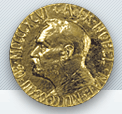Malala Yousafzai and Kailash Satyarthi were awarded the 2014 Nobel Peace Prize by the Norwegian Nobel Committee, "for their struggle against the suppression of children and young people and for the right of all children to education.” UN Secretary-General Ban Ki-moon and UN Educational, Scientific and Cultural Organization (UNESCO) Director-General Irina Bokova were among the UN officials welcoming the prize and the recipients' work.
 10 October 2014: Malala Yousafzai and Kailash Satyarthi were awarded the 2014 Nobel Peace Prize by the Norwegian Nobel Committee, “for their struggle against the suppression of children and young people and for the right of all children to education.” UN Secretary-General Ban Ki-moon and UN Educational, Scientific and Cultural Organization (UNESCO) Director-General Irina Bokova were among the UN officials welcoming the prize and the recipients’ work.
10 October 2014: Malala Yousafzai and Kailash Satyarthi were awarded the 2014 Nobel Peace Prize by the Norwegian Nobel Committee, “for their struggle against the suppression of children and young people and for the right of all children to education.” UN Secretary-General Ban Ki-moon and UN Educational, Scientific and Cultural Organization (UNESCO) Director-General Irina Bokova were among the UN officials welcoming the prize and the recipients’ work.
Ban said two of the world’s greatest champions for children are honored with the Prize. He reiterated the words and actions of Yousafzai, an activist for girls’ education, who said “one pen can change the world” and showed that terrorists’ greatest fear is a “girl with a book.” Ban said Satyarthi has led the global movement for justice, education and a better life for millions of children trapped in exploitative child labor, and has worked tirelessly to raise awareness about and oppose child labor. He added, “Malala is a daughter of the United Nations,” and said the UN would continue to stand with her for the right of girls everywhere to be free of violence, to go to school and to enjoy their right to an education.
Bokova said both Yousafzai and Satyarthi have worked with UNESCO to promote education, particularly for girls and child laborers. She recalled Satyarthi’s role in the global movement to end child slavery and exploitative child labor since the 1980s. She said the award sends the message that “education is vital for peace and development.” She noted that women represent two-thirds of the world’s illiterate population, with 31 million girls lacking access to primary and secondary education.
The UN Children’s Fund (UNICEF) noted that the award coincides with the 25th anniversary of the Convention on the Rights of the Child, and said the award will inspire children “who battle silently in their own lives for the right to an education and the right to be heard and protected.”
UN Women Executive Director Phumzile Mlambo-Ngcuka said empowered girls like Malala are the “best drivers of growth, the best hope for reconciliation in conflict, and the best buffer against the radicalization of youth and the repetition of cycles of violence.”
The Nobel Committee cited the importance of a Hindu and a Muslim, an Indian and a Pakistani, joining in “a common struggle for education and against extremism.” [Nobel Peace Prize Press Release] [Statement of UN Secretary-General] [Statement of UNESCO Director-General] [UN Press Release] [UNICEF Statement] [Statement of UN Women Executive Director]